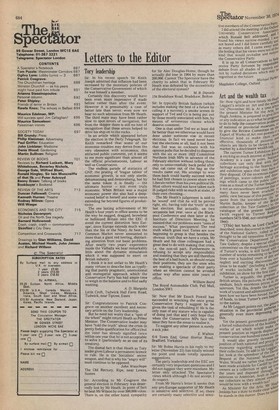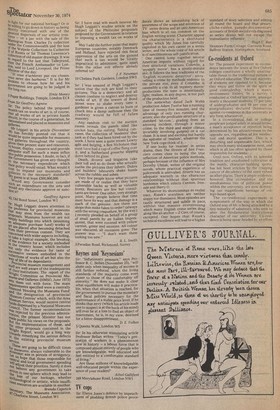Art and the wealth tax
Sir: How right and how timely Mr Leggatt's article on 'Art and the wealIe tax' (November 16) is. At a time.eite4 the present Minister for the A1'itte Hugh Jenkins, is prepared to giva' or any indication as to what he proPcse5 to do to help the conservation probleras of national or provincial museums, „°: to give the Review Committee on Export of Works of Art real powers °I. k financial kind to make their. 'Ord effective, thousands of picturee the objects tsare likely to be thrsem on market by a doctrinaire wealth Wt. current Turner Exhibition er is exciting so much interest at the 1Z' liMa ical Academy is a case in point. Natr collections can only deal with their ahoe dr i teaxghe ibaictci 000r dsi pn agc too tthhaet ftihnear,bea vset a, rt their disposal. Of the enormous Ormeof paintings, water-colours and dray:" 0116" ings which came to the public 65 tions as a result of the Turner Segues:co • it not an extraordinary situation the' io many have never been available,,,-„, public view because of this poesithioe; quote from the introduction tbY„es Martin Butlin, keeper of the 13t"'ti-e collection at the Tate Gallen,/ t° n 'catalogue of the present xB (with regard to Turner numbers 5473-5546, not catalogueenI 1944): `eoluTthhoist ][ to beboaldtctha, asLordl. :::Isrs described, were discovered in the 01134 of the National Gallery, rolled tiP s„"0Conservation Department nt ef jittee Tate Gallery, despite a special eff°R.,.ng concentrate on the magnificent hole,' a of Turner's works, is still faced wit'La rl number of works remaining to be fr"--4 from over a hundred years of dirt a„. neglect andabnedmeaxdcei,t,i(nigocdloisdcioog a n discoveries '"2c:brie'tr u of works included in the car,' exhibition, on show for the first tirneeof Turner is, arguably, the greatestver British artists. His pictures, in whd,teise medium, fetch enormous prices, 'timed saleroom. Yet this, despite the oev"„at wtootrhkeonf nation. es and administrators, "..s been efno ohdosw,two etrheaavte Tbuereonerf,cisrocw1 fbde(rIluaeLs'i sitAuastMiorn
dssig that
generally ga that generally even more epren this. Leinegtahtet points out, thellgereireies1 Yet the present government propesei a forced redistribution of the holding ae works of art which would make °IA present position as regards displaY af); conservation one hundred times viershi It would also gravely threaten tr position of both national and proviec,.°, m r Leg•gette; theuisreourns oi ie otrieogoasrdTion gadda ctqo umi siti 19: list, look at the splendour of the 0; Bequest at the National Museurli_d b:Vew:nnl eesmr.saWadseo uaalvdcaowi lueebcrlteai otfhonerrocrt uhsndaptli ifttfh ube )ps, lea; jhtwehednesukt liaydr Inesbda ehrssani nsoa and disposed through re ese collectors as they saleroom to American, Arab or JaPat., As Minister for the Arts.awthis d with matter. h attot emr make eoecsl ehaer theep eaAalnilitthoss.ttarviscr?erti;i: .-Tectator November 30, 1974 10 fight for our national heritage? Or is he willing to go down in history as being directly concerned with one of the greatest dispersals of our artistic trea Lures — on a par with the sale of the Ivlantegras from Charles l's collection under the Commonwealth and the loss of the VValpole Collection to Catherine
of Russia or Sir Thomas Lawrence's collection of old master drawings. It was in regard to the last that Talleyrand, then the French Ambassador to London, said to Lord Liverpool, the Prime Minister of the day:
"Si vous n'achterez pas ces choses, vous serez des barbares." It is for Mr Jenkins to choose how he and his g°vernment are going to be judged in the long run.
Ernie Money .5 Papa. Buildings, Temple, London EC4 From Sir Geoffrey Agnew
Sir: The policy behind the proposed wealth tax on works of art is, of course, that all works of art in private hands should, in the course of a generation, be nationalised and placed in museums and gallerie5 Mr . l-eggatt in his article (November 'pi has forcibly pointed out that it 'would be quite impossible for museums and galleries throughout the 'country, given their present state and resources, to house, display, conserve and provide ilecluate staff for such a mass influx Into public possession. I doubt, in fact, i' the Government has given any thought to the necessary expenditure which their policy would entail. What would it cost to expand our museums and ,.alleries to the necessary standards? mY guess is at least £300,000,000. Would any Government consider woidsucuhan expenditure on the arts and Mon it? any electorate approve or sancGeoffrey Agnew 43, Old Bond Street, London WI
Sir. ,
4" Hugh Leggatt draws attention to .1,e problems for provincial museums at may stem from the wealth tax sPi,„1.°13°, sals. Museums however are not ""1:11Y buildings into which (assuming all adequate purchase fund) works of r4_rt are placed after becoming detached nal their previous context. They are !:oncerned with wider aspects including, too_ take a topical example, the breakup t the evidence for a society embodied hi' the country house; which includes °olY the evidence for taste of successive owners embodied in the collections of works of art but also the waY of life of its dependants.
Provincial museum management and !aft are well aware of the inadequacies their institutions. The report of the :right Committee on Provincial MuGalleries (HMSO, June 1973)
• "1-s them out with force. The main Zquirements specified were a centrally ,na,oced 'Housing the Museums Fund' the designation of provincial hi "earn Centres' which, with the Area C.useum Service, would receive central 4e,„44:11ids dispensed by a National Museums
The former recommendation
tr— rejected by the previous adminisattoo; the present Minister has not
made public his views on the proposals.
ti..ut the implementation of these, and Vother proposals contained in the toright Report, would go a long way Wards remedying the serious defects ir2 the e
service xisting provincial museum These are going to be difficult times
(1,Laluseums; always vulnerable to the iZtooMic axe in periods of stringency. cen,us
hope that those responsible for
and local government spending non: adjust their priorities. Surely it does ,act behove any government to take theticm in one sphere which may lead to loss of our heritage, whether areha eoiogical or artistic, while insuffi,Ient resources are available in another. Brenda Capstick t
Secre—. • °.Y, The Museums Association,
■ -narlotte Street, London WI Sir: I have read wih much interest Mr Hugh Leggatt's erudite article on the subject of the Philistine proposals proposed by the Government in relation to imposing a wealth tax on works of art.
May I add the further point that many European countries, notably Denmark and Holland, have rejected this fiscal oppression of the arts on the ground that such a tax would be totally impractical to administer, quite apart from the other evil effects already referred to?
J. F. Newman 10 Chelsea Park Gardens, London SW3 Sir: I "was amazed at Hugh Leggatt's notion that the rich are kind to their pictures. This is a democracy and all classes combine to neglect and destroy works of art. If the towers of Bond Street were to shake every time a gardener is given a canvas to burn or chuck into a damp outhouse then the roadway would be full of fallen masonry. Any random visit to the auction rooms reveals the panels oiled like cricket bats, the rotting, flaking can vases, the collection of 'moderns' that look as if they had been hired out by the week. I have seen a quite recent Lowry
split and bulging, a Ben Nicholson that must have had a cup of coffee flung over it, and a Sutherland gouache slipping down behind its glass.
Death, divorce and litigation take their toll and so do those who actually loathe the pictures they inherit. Dukes and builders' labourers shake hands across the rubble and ashes: Very few people know what pictures are made of or realise that they have vulnerable backs as well as valuable fronts. Restorers are few but consultants are fewer. One other, very strange,
point. Many people believe that time must have its way and that damage is a mark of the genuine. Are there not shops that make fakes to order? (always with the wrong craquelure, by the way). 1 recently pleaded on behalf of a group of small panels by an Italian Impressionist, that were covered with yellow varnish, grime and nicotine. All colour was obscured, all recession gone. The answer was — "I. don't want them looking too new."
R. L. Smith 3 Paradise Road, Richmond, Surrey











































 Previous page
Previous page